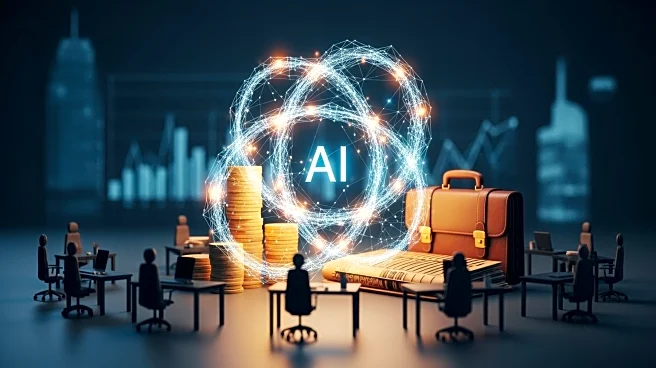What's Happening?
Goldman Sachs has informed its employees of impending job cuts driven by artificial intelligence (AI) as part of its OneGS 3.0 strategy. The New York-based financial firm plans a limited reduction in roles across the company to achieve savings and leverage
efficiencies gained through AI. Despite these cuts, Goldman Sachs expects to end the year with an overall increase in headcount, having added approximately 1,800 employees since last year. The memo from top executives highlights AI's role in enhancing operational efficiency across client onboarding, lending processes, regulatory reporting, and vendor management. The bank's leadership emphasizes the need for greater speed and agility to fully benefit from AI's potential.
Why It's Important?
The announcement reflects a broader trend in the financial industry towards automation and AI integration, which can significantly impact employment and operational practices. While AI offers potential cost savings and efficiency improvements, it also raises concerns about job security for employees whose roles may be affected. The move by Goldman Sachs could influence other financial institutions to adopt similar strategies, potentially leading to widespread changes in the industry. The focus on AI-driven efficiency underscores the importance of technological adaptation in maintaining competitiveness in the financial sector.
What's Next?
Goldman Sachs' implementation of AI solutions is expected to be a multiyear effort, with ongoing assessments of where AI can be most effectively deployed. The bank's approach may prompt discussions among industry leaders and policymakers about the implications of AI on employment and the need for workforce retraining. As AI becomes more integrated into financial operations, stakeholders may explore regulatory measures to address potential challenges related to job displacement and ethical considerations in AI usage.
Beyond the Headlines
The shift towards AI-driven efficiency raises ethical questions about the balance between technological advancement and workforce impact. As AI continues to transform industries, companies must consider the social implications of automation, including the need for reskilling and support for affected employees. The integration of AI also highlights the importance of transparency and accountability in its deployment, ensuring that technological benefits are equitably distributed.

















